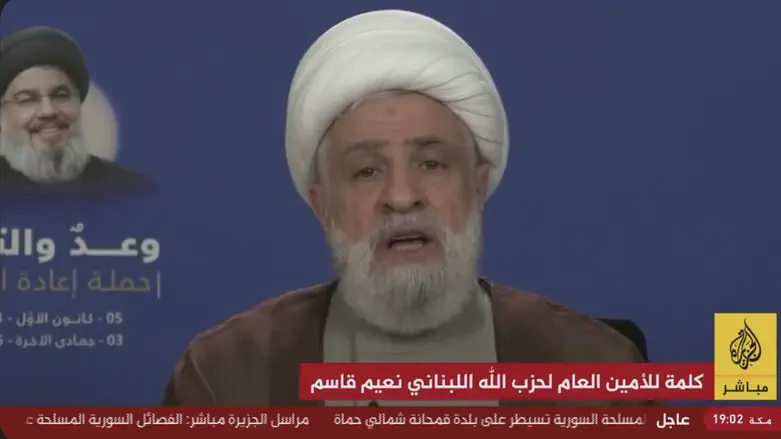Almost Heaven
Well-known
Hezbollah Secretary General Naim Qassem delivered an extended address in Baalbek on Friday, vowing that the movement "will not hand over its weapons as long as the occupation exists and aggression continues." He said Hezbollah would fight a "Karbala-like battle" — a reference to the 7th-century clash central to Shiite identity — against what he described as the American-Israeli project, expressing confidence in victory, and placing "full responsibility on the Lebanese government for any strife that may occur."
Qassem accused the government of abandoning its duty to defend Lebanon, declaring, "Defend Lebanon, and let us build the country together, because it cannot be built by one component alone. This is our country, and we build its sovereignty together; otherwise, there will be no life for Lebanon if you stand on the other side. Either Lebanon remains and we remain together, or to the world, farewell."
He sharply attacked the decision to disarm the group, saying it "strips Lebanon, the resistance, and its people of defensive arms during aggression," facilitating the killing and displacement of fighters and civilians. He charged that the move implements "an American decision and serves the Israeli project, whether you know it or not," and asked, "Were you pleased that Netanyahu praised you? Notice the joy and Israeli statements!"
Qassem rejected government claims of external pressure, likening the decision to choosing to kill one's own children for money. He said, "Do not be afraid, and do not live under intimidation. You are protecting yourselves, not the country." He argued that if the government cannot confront Israel, it should "step aside" and allow Hezbollah to do so.
He warned against dragging the army into internal strife, praising its leadership for avoiding such involvement. He said Hezbollah and Amal delayed taking to the streets to allow for dialogue, but if confrontation is forced, "we are ready. Then protests may head to the streets, to the American embassy, or elsewhere."
Qassem asserted that Hezbollah’s legitimacy comes from the Taif Agreement, the constitution, and the sacrifices of its fighters, not from the government. He said the resistance has achieved key victories, including ending Israeli occupation in 2000 and defeating ISIS in eastern Lebanon in 2017, with the army’s support.
He described the July 2006 war as "a great victory" for the army, people, and resistance, claiming it established 17 years of deterrence against Israel. He credited Hezbollah leader Hassan Nasrallah's wartime leadership and thanked Iran for financial, military, and political support, singling out the late Qassem Soleimani.
Qassem linked Hezbollah’s struggle to the Palestinian Arabs, vowing: "Palestine will remain the compass. All that Israel does, and all that America supports, will not deter the Palestinian people from resistance."

 www.israelnationalnews.com
www.israelnationalnews.com
Qassem accused the government of abandoning its duty to defend Lebanon, declaring, "Defend Lebanon, and let us build the country together, because it cannot be built by one component alone. This is our country, and we build its sovereignty together; otherwise, there will be no life for Lebanon if you stand on the other side. Either Lebanon remains and we remain together, or to the world, farewell."
He sharply attacked the decision to disarm the group, saying it "strips Lebanon, the resistance, and its people of defensive arms during aggression," facilitating the killing and displacement of fighters and civilians. He charged that the move implements "an American decision and serves the Israeli project, whether you know it or not," and asked, "Were you pleased that Netanyahu praised you? Notice the joy and Israeli statements!"
Qassem rejected government claims of external pressure, likening the decision to choosing to kill one's own children for money. He said, "Do not be afraid, and do not live under intimidation. You are protecting yourselves, not the country." He argued that if the government cannot confront Israel, it should "step aside" and allow Hezbollah to do so.
He warned against dragging the army into internal strife, praising its leadership for avoiding such involvement. He said Hezbollah and Amal delayed taking to the streets to allow for dialogue, but if confrontation is forced, "we are ready. Then protests may head to the streets, to the American embassy, or elsewhere."
Qassem asserted that Hezbollah’s legitimacy comes from the Taif Agreement, the constitution, and the sacrifices of its fighters, not from the government. He said the resistance has achieved key victories, including ending Israeli occupation in 2000 and defeating ISIS in eastern Lebanon in 2017, with the army’s support.
He described the July 2006 war as "a great victory" for the army, people, and resistance, claiming it established 17 years of deterrence against Israel. He credited Hezbollah leader Hassan Nasrallah's wartime leadership and thanked Iran for financial, military, and political support, singling out the late Qassem Soleimani.
Qassem linked Hezbollah’s struggle to the Palestinian Arabs, vowing: "Palestine will remain the compass. All that Israel does, and all that America supports, will not deter the Palestinian people from resistance."

Hezbollah leader threatens: We will not hand over weapons
Hezbollah chief Naim Qassem warned that disarming the group could spark internal conflict, vowing to keep its weapons 'as long as the occupation exists and aggression continues.'
